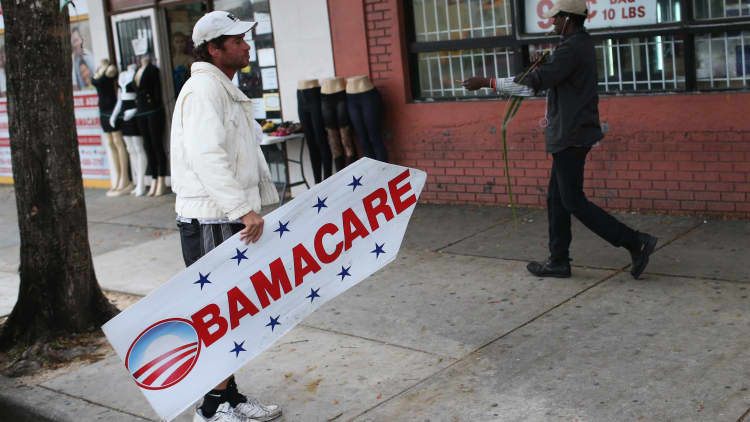
If you haven't signed up for health insurance through the Affordable Care Act, you are running out of time.
You have until Tuesday, Jan. 31, to apply for 2017 coverage through state and federal marketplaces. More than 11.5 million people have signed up for insurance through the exchanges as of Jan. 10.
President Donald Trump has been vocal about his plans to repeal and replace the Affordable Care Act, commonly known as Obamacare. Congress also has taken steps to undo the landmark health-care law.
What will unfold in 2018 is still a mystery; for now, the best decision is to lock in coverage while you still can.
"As the market starts to behave in funny ways and insurers start leaving, you might find that your coverage is disrupted," said Karen Pollitz, a senior fellow at the Kaiser Family Foundation. "The safest thing is to sign up and see what happens."
Here's how to get the most out of your insurance, once you've signed up.
Leverage deductibles
It's a good practice to leverage your deductibles. Start with your wellness visits first, so you can address any developing problems and get closer to your annual out-of-pocket spending maximums. That way, if health issues do arise, your plan will generally cover 100 percent of your costs.
For those who are concerned about their coverage changing amid an overhaul of the ACA, it's better to seek care now.
"Don't put off health problems that need to be resolved," said Kathryn B. Hauer, a certified financial planner at Wilson David Investment Advisors in Aiken, South Carolina.
Keep an eye on your subsidies
Individuals who depend on subsidies to afford their coverage ought to keep a close eye on House v. Burwell, a lawsuit that dates back to 2014.
In this action, the House of Representatives alleged the Obama administration was spending funds without formal approval from Congress in order to reimburse health insurers who offered low-income applicants cheaper plans.
Last spring, U.S. District Judge Rosemary M. Collyer ruled in favor of the House. The case is now in federal appeals court, and what happens next may depend on how Trump proceeds.

The "Smiths" buy subsidized health care on the exchanges.
(Numbers are from the Kaiser Family Foundation and are based on U.S. averages. Figures will vary by state.)
Consider a non-smoking family of four — two adults and two kids — with a household income of $70,000.
Based on these statistics, the Smiths' income is equal to 287 percent of the poverty level, which will likely qualify them for subsidized health insurance, according to Kaiser's subsidy calculator.
This means the Smiths are eligible for $379 per month in premium tax credits.
A silver plan, in which the insurance company generally pays 70 percent of costs, will run the Smiths $543 per month in premiums.
The most the Smiths will have to pay for a silver plan is equal to 9.32 percent of income.
Without help, the family would be paying $923 per month.
"Maybe Congress will back down and appropriate the money for the subsidies, or the White House might say they'd rather lose the case and have the subsidies end abruptly," said Pollitz at the Kaiser Family Foundation.
"If subsidies ended abruptly, there's a commonly held expectation that insurers selling those policies through the marketplace might get out during the year," she added.
Fund your HSA
If you already have a health savings account as part of a high-deductible health-care plan at work, continue to contribute to it. That way, if you lose your company coverage, you can use the money in the HSA to offset medical costs.
HSAs enjoy a triple-tax benefit. Contributions are tax-deductible and are taken out pretax if made through payroll deductions. Earnings grow free of taxes, as well, and you can use the money tax-free to cover qualified medical costs.
HSAs are also likely to stick around, as they've been endorsed by Rep. Tom Price, (R-Ga.), Trump's pick to lead the Department of Health and Human Services.
This year, you can contribute up to $3,400 to an HSA if you're only covering yourself. Under a family plan, the contribution limit is $6,750. Those age 55 and over can kick in another $1,000.
"Under the IRS guidelines, contributions to an HSA are good forever and in all times," said Aaron Benway, co-founder of HSACoach.com, a provider of health document storage services for HSA savers.
"The tax code will provide relief for medical expenses, independent of the Affordable Care Act," he said. "It's never a bad idea to save more."



